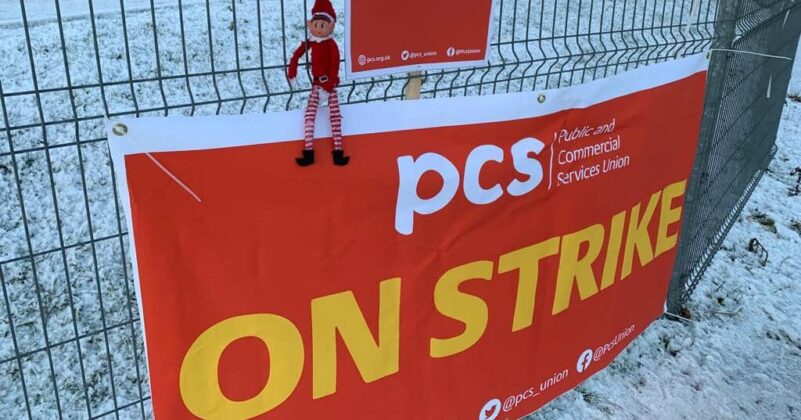

By a PCS activist
THE LEADERSHIP of the Public and Commercial Services union (PCS) is consulting branches on whether to end civil servants’ campaign of industrial action. In response, branches committed to further action have launched PCS Say No, demanding that the union’s membership is balloted.
Scandalously, the PCS has taken just three days of national strike action over two ballot periods, alongside targeted action of smaller groups of workers. So far, the campaign has achieved an average pay rise of 4.5 percent for 2023–24 and a lump sum of £1,500 for 2022–23, in addition to the 2% raise already paid.
Since the lump sum was announced, the union’s national executive has delayed the re-ballot of members in HMRC and DWP, the two largest departments. After branch consultation, the NEC will decide whether to end or continue the dispute, or to put that decision in the hands of its membership.
Yet the lump sum itself is not settled. Many departments have decided to pro-rata the payment for part-time staff or are still deciding whether to allow staff on Universal Credit to spread out the payment so that their claim is not arbitrarily closed. The British Museum is point-blank refusing to pay it; as a result workers at the museum will be striking from 12 to 16 July.
PCS Say No
The campaign started in late June at the instigation of two Scottish DWP branches and the DLUHC (Department for Levelling Up) national branch. It has the backing of two factions in the union, Independent Left and Broad Left, and has quickly gathered support. A list of branches that have passed the campaign’s model motion is yet to be published, but members of 36 branches attended the campaign’s first meeting and many more have since joined.
The campaign is also supported by a minority on the NEC and has won the backing of the London and South East region—representing about 25% of the union’s membership. There is a degree of confidence that union members will vote to continue the strike if the campaign can successfully persuade the NEC to ballot.
Civil Servants have suffered pay restraint since the last recession, alongside other public sector workers, and entered this period of high inflation with pay already eroded by years of below-inflation pay ‘rises’. One in five people working for the DWP are themselves on Universal Credit, 12% have a second or third job and 11% had to use food banks in 2022.
Civil servants know the government has no intention of awarding above-inflation rises in the coming years to make up for what we are losing now. If we accept the pay offers for 2022–23 and 2023–24 we will suffer a 10% slump in our real pay, which will never be clawed back without further strike action. So, many are thinking, why stop now?
What next?
The union’s Frequently Asked Questions on pay suggests we should settle the dispute for the following reasons:
‘If we were to continue the dispute in order to win the full claim, there would need to be a substantial escalation in industrial action. To date, we have won important concessions and put money in members’ pockets, and we have won parity of treatment with other public sector workers. To go further and breach the government public pay policy solely for civil servants would require a major escalation of strike action in what would necessarily be a long campaign. At the same time, no other civil service unions would be in dispute. There are now far fewer public sector unions in dispute over pay than previously. We would also need to win re-ballots in the two largest groups in the union.’
This is the most cowardly piece of scaremongering, posed by a supposedly left wing union in a deliberately negative way. A key point made in the first meeting of PCS Say No was that most of us have only taken three days of strike action, despite having live ballots since November 2022. We cannot afford to take the first offer on the table while inflation continues at historic levels.
Sharply escalating action building to an all-out strike would not only paralyse the government, it would also raise the profile of our campaign — and with it the possibility of solidarity fundraising and industrial action. We could appeal over the heads of the other unions for a public sector alliance to end low pay through coordinated strikes.
The development of PCS Say No shows how we can run a strike that is branch-led, in terms of what we campaign for, how we strike and what deal is eventually made. Like NHS Workers Say No, Postal Workers Say No and UCU Grassroots Left, it is a network of trade union reps and activists that has the potential to become a rank and file organisation capable of imposing the will of the union membership over that of the bureaucracy.